Following the fall of Singapore last week the Japanese continued their seemingly unstoppable advance, advancing into Burma, bombing Darwin in Australia and invading Bali and Timor. As the American defence of the Philippines collapsed, General MacArthur was reassigned to the defence of Australia. On 16 February, Japanese forces on Bangka Island massacred 20 Australian nurses and some 60 Allied soldiers and seamen, survivors of the fall of Singapore.
 Mrs Miller, the teacher at John O’Groats School, made a brief, tragic entry in the log book on 20 February: “School was closed from 17th to 20th Feb. as my husband has been reported missing.”
Mrs Miller, the teacher at John O’Groats School, made a brief, tragic entry in the log book on 20 February: “School was closed from 17th to 20th Feb. as my husband has been reported missing.”
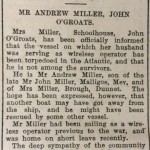
A report in the John O’Groat Journal the following week told the sad story: “Mrs Miller, Schoolhouse, John O’Groats, has been officially informed that the vessel on which her husband was serving as wireless operator has been torpedoed in the Atlantic, and that he is not among the survivors.” The paper added, “The hope has been expressed, however, that another boat may have got away from the ship, and he might have been rescued by some other vessel.”
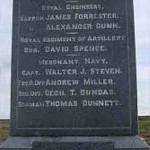 Sadly, Andrew Miller never returned home. He is recorded on the Canisbay War Memorial (image courtesy of Caithness.org) and also on the Commonwealth War Graves Commission website, which adds the information that he was serving in the Merchant Navy on the SS Empire Sun. He was only 37.
Sadly, Andrew Miller never returned home. He is recorded on the Canisbay War Memorial (image courtesy of Caithness.org) and also on the Commonwealth War Graves Commission website, which adds the information that he was serving in the Merchant Navy on the SS Empire Sun. He was only 37.
Meanwhile, the citizens of Caithness continued to be faced with dangerous items on their 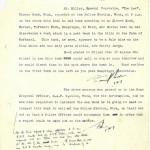 property. On 16 February Albert Hood, a farmer at Toftcarl Farm, Hemriggs by Wick, told the police that “he had discovered a bomb stuck in a peat bank in the hills on the farm of Toftcarl.” The police passed the information to R.A.F. Wick, and the bomb disposal officer went to investigate. A note in the margin states: “He found it was an R.A.F. smoke-bomb and he disposed of it.”
property. On 16 February Albert Hood, a farmer at Toftcarl Farm, Hemriggs by Wick, told the police that “he had discovered a bomb stuck in a peat bank in the hills on the farm of Toftcarl.” The police passed the information to R.A.F. Wick, and the bomb disposal officer went to investigate. A note in the margin states: “He found it was an R.A.F. smoke-bomb and he disposed of it.”
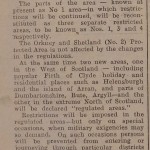 With Germany fully committed to fighting in Russia the authorities were able to relax some of the restrictions on travel to the North Highlands. The John O’Groat Journal reported that from the first of March, “a large part of the North of Scotland, which is meantime classed as a “protected area” … will become de-restricted”. Only the north of Sutherland and Caithness within five miles of the coast, and part of the east coast, would remain restricted; the rest of the county would be “de-restricted” unless in case of an emergency.
With Germany fully committed to fighting in Russia the authorities were able to relax some of the restrictions on travel to the North Highlands. The John O’Groat Journal reported that from the first of March, “a large part of the North of Scotland, which is meantime classed as a “protected area” … will become de-restricted”. Only the north of Sutherland and Caithness within five miles of the coast, and part of the east coast, would remain restricted; the rest of the county would be “de-restricted” unless in case of an emergency.
Finally this week the Director of Education provides an insight into mid-day meals in rural schools across the 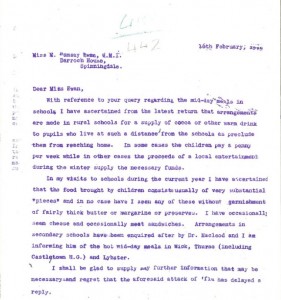 county, in a letter to H.M.I. dated 16 February. Children who lived too far to return home for lunch were provided with cocoa “or other warm drink”, at a charge of a penny a week: “in other cases the proceeds of a local entertainment during the winter provide the necessary funds”. As for solid food, “the food brought by children consists usually of very substantial ‘pieces’ and in no case have I seen any of these without garnishment of fairly thick butter or preserves. I have occasionally seen cheese and occasionally meat sandwiches.”
county, in a letter to H.M.I. dated 16 February. Children who lived too far to return home for lunch were provided with cocoa “or other warm drink”, at a charge of a penny a week: “in other cases the proceeds of a local entertainment during the winter provide the necessary funds”. As for solid food, “the food brought by children consists usually of very substantial ‘pieces’ and in no case have I seen any of these without garnishment of fairly thick butter or preserves. I have occasionally seen cheese and occasionally meat sandwiches.”
